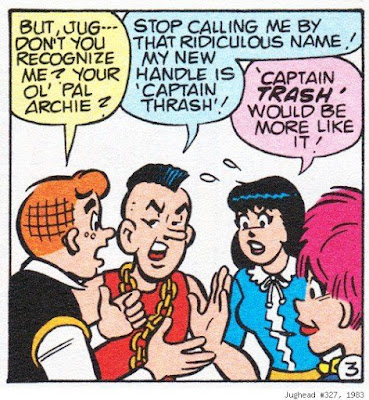I KNOW IT'S OVER, OR "WE ARE THE CLASH: REAGAN, THATCHER, AND THE LAST STAND OF THE ONLY BAND THAT MATTERED
Casual fans of the Clash likely think the band broke up after performing to about 400,000 at the US Festival, probably due to the usual "creative differences." This is understandable, since most histories and collections completely omit "Cut the Crap," the 1985 album made without co-writer Mick Jones, although sometimes including the song "This is England."
I'm not going to defend "Cut the Crap" since I haven't heard it in years, but I remember liking it alright, although even my untrained ears thought it sounded too slick. As a huge Clash fan, I probably ranked it with "Sandinista," an album with some good songs on it, but one that for the most part, I just didn't get (My friend Keith had a great defense at the time - noting that the cover had a guy with a mohawk, the title had an almost curse word in it, and since it was readily available, you kinda had to make yourself like it).
 |
| OK, so maybe that wasn't the strongest defense |
So we have a legendary band with a two-year gap that has, for the most part, been underreported, or written off. Sounds like fertile ground for a book!
And Mark Andersen and Ralph Heibutzki are able to craft an interesting story of the final years of the Clash intertwined with the British (and American for some part) political scene.
Naturally Joe Strummer is the focal point and he is a conflicted mess. After achieving success he's not sure what else to do. His partner Mick Jones (who was much more comfortable with the rock star life, if the book is to be believed) has left/been fired, and Strummer is determined to carry on. He becomes a father, loses his own father, and is torn between his manager's plans, his new band (who are treated more like hangers-on), and his desire to relaunch the Clash with an album that is as gritty and hard-hitting as the debut.
He's also dealing with major depression which he treats with booze and disappearing to Spain where he can be relatively anonymous, as well as being attacked by more radical bands for being part of the same multi-national corporate system he was railing against.
Intertwined with Strummer's tale is the story of Margaret Thatcher's attempts to privatize more and more of England's economy and the resulting miner's strikes. I was particularly struck by the miner's families changing attitudes towards police and authority after being on the receiving end of the nightstick, as well as the miner's wives awakening to their power as they organized with their husbands, realizing that they were smarter and better organized than they had ever been lead to believe.
As a last ditch effort to connect with both his band and his fans, Strummer took the band on a busking hitchhiking tour of England, hitting areas badly hit by the strikes, and relying only on whatever money they made playing in the streets. Sure, it could be seen as a cynical attention grab, and they could have helped the areas more if they toured during the strikes, but at best, it shows Strummer desperate to emotionally connect, to make people (and himself) feel something.
After this last tour "Cut the Crap" is released, and it is not the back-to-basics rebirth Strummer wanted.
Andersen and Beibutzki are able to keep the different threads going, although it might have been an easier read if the miner stuff were in opposing chapters. As it stands, it can be somewhat jarring to read about a rock star's depression and then a paragraph later read about a miner's family getting beaten up by cops or not having enough to eat.
It's still a compelling read, and it definitely made me rethink the Clash. At 15 I thought they were gods. At 22 I thought they should have done more than sloganeering on a major label (although I'd be hard-pressed to tell you what, and still loving the debut and "London Calling."), at 50, I just wanted Joe Strummer to talk to some friends or a therapist.
Sex/Drugs/Bad Behavior
4/10. There's lots of booze - Strummer was big on self-medication, and there's some weed and a section on how the drummer and some other friends were wrecked by harder drugs. The "new Clash" had an anti-drug stance (ignoring alcohol), which was somewhat stuck to.
Opens in Media res?
Technically? Opens with the Clash busking in a depressed ex-shipbuilding town in England, then launches into a description of the book to come.
Percentage of Music in the Bio
Let's say 50 percent. There's the running evolution of a never-released song "In the Pouring Rain," as well as talks about the different mixes of songs on "Combat Rock" and a lot of performances, from huge stadiums to the band playing at train stations.
Buy, Borrow from the Library, or Pass
Definitely worth buying cheap or checking out if you're a rabid Clash fan.


Comments
Post a Comment